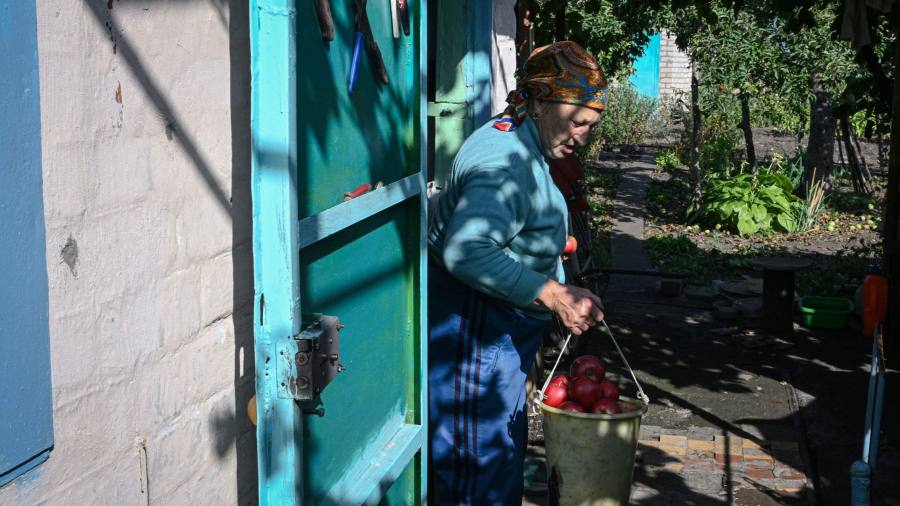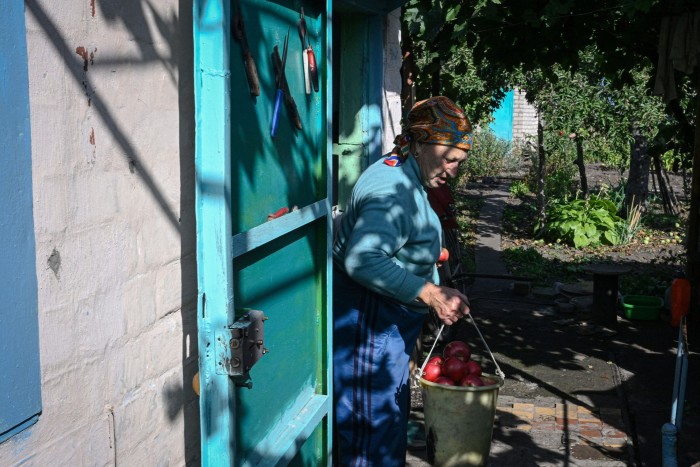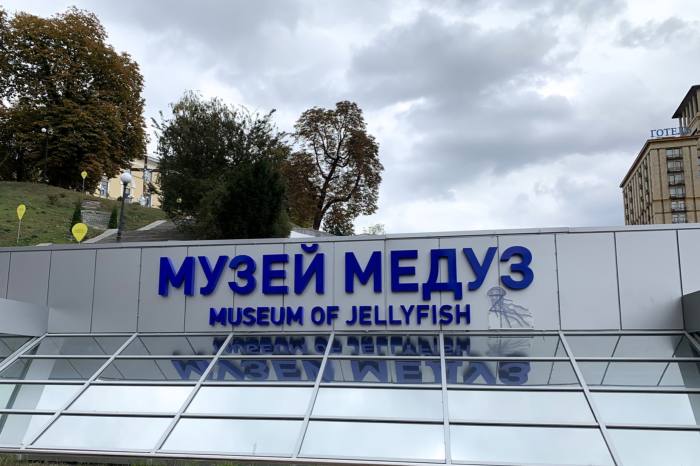

Strange, but the horrors of war have not cancelled the “toy” horrors of Halloween — a cultural import that took root in Ukraine in the late 1990s and has become popular among young people.
Halloween decor has become the same hot commodity as Christmas tree decorations before the new year. And now, when all Ukrainian media are filled with visual horrors of the war, plastic bloody heads, giant cobwebs and other Halloween accessories have nonetheless appeared on the shelves of some stores. Most importantly, among these decorations, a new product appeared: “Putin’s coffin”, an ordinary life-size wooden coffin with the Russian leader’s name on the lid and a label that reads “souvenir coffin”. These are now being sold in Kyiv at the Zhitniy Market in Podil. Vendors say they are being bought by restaurants that are counting on customers who want to celebrate the “horror holiday” with a good dinner.
I really want to believe that the Halloween horror holiday will not be cancelled by real Russian horrors — Iranian kamikaze drones and missiles.
Arranging outings and festivities during a war is a controversial but necessary matter. They help reduce stress. Many Kyivans who didn’t make a habit of visiting museums before the war now make a point of checking which museums are going to be open at the weekend. The Khanenko Museum — Kyiv’s largest collection of European paintings — had to close after all the windows of the historic building were blown out by a missile and then covered with plywood. The Museum of the History of Medicine, located in another part of the city centre, is working.
And, of course, there is a museum of living jellyfish on Independence Square. It is underground and could well serve as a bomb shelter. This is a private museum and clearly belongs to some strange man who is in love with jellyfish and contains the largest, if not the only, collection of rare live jellyfish in Ukraine. I never visited this museum for what might seem like an absurd reason. Its location — a big underground space in the very centre of the city — used to be the main public toilet. When it was closed, I was outraged. And when a private museum of jellyfish was opened in its place, I took it to be some kind of joke.
Since then, two large public toilets have appeared nearby in the underground shopping mall, so my indignation has lost all its puff. When the Museum of Jellyfish announced that admission for combatants and soldiers was free, any negative feelings I might have retained about the museum evaporated. My son Theo recently spent almost two hours there, in the semi-darkness, looking at the backlit rare jellyfish swimming in large aquariums built into the walls. I imagine that the military folk would like this museum. For a short while, they can immerse themselves in a world a million miles from war.
Strangely, I associate jellyfish with autumn, like mushrooms and yellowed tree leaves. I don’t know why such associations arise. Maybe it is just because it is autumn now and the leaves — yellow and red — are already falling from the trees and covering the ground in gardens and on the roads of villages and cities.
This autumn, many unpicked apples hang in the orchards, and in the gardens near the destroyed houses in the Donbas and in the south of Ukraine, and the gardens of the living inhabitants of the part of the country free from the invaders.
And in my village Lazarivka, winter apples still hang on trees. There are also a lot of them in our garden and, because of their weight, the branches of apple trees have broken. We have a lot of apples and walnuts in our garden this year. The eldest son sent me photos of apple trees and buckets of nuts. The garden has become overgrown during our absence. There is a lot of work to be done to put it in order. My wife Elisabeth bottles apple purée for the winter from morning to evening. We also have an electric fruit dryer to make apple slices for the special Ukrainian drink, uzvar, which is particularly important at Christmas time.
Last week, the village children started to go to the local school for lessons again. They had been studying online for two weeks. The last Iranian drone flew over the roof of our rural house almost 10 days ago. Since then, life in the village has returned to its usual rut. All four of the village’s shops are well stocked and fresh bread is delivered every day.
Recently, funeral music could be heard in the neighbouring villages. In Kostivtsi, Stavishche, and Morozivka, Ukrainian soldiers killed while defending their country were brought home to be buried.
Twenty-five men from our village are fighting in the war with Russia; all are alive. Fellow villagers often talk about this, and immediately cross themselves, silently praying that it stays that way — that they all come back alive. I know some of the soldiers from our village but I don’t know on which part of the front they serve. You are not supposed to ask relatives about it — it’s a state secret, even parents are not supposed to know.
There are again more children’s voices in the village — young families from Kyiv have moved in with their relatives in Lazarivka, as they did during the pandemic. After the recent shelling of Kyiv, life in the village seems safer. Children from Kyiv study online. Few parents are thinking of returning to the city in the near future.
In a strange way, the proof of the normalisation of life in the village and throughout the region is the restoration of the previous level of crime. It seems to be happening all over the country. Once more there are carjackings, an increase in thefts, and robberies. There was even a police raid in our Lazarivka recently and arrests were made.
Twelve young guys from the area were arrested for organising a fake recruitment agency. They pretended to be arranging work abroad for Ukrainians. They asked for an upfront fee to arrange the paperwork and then disappeared. The most surprising thing was that the alleged organiser of this criminal scheme was the son of our friend, not a poor man, the owner of one of the village grocery stores. I remember him as a boy helping his parents. He seemed to spend all his free time behind the counter of the store. Several of the suspects were released on bail for the period of the investigation, but the main organisers — including the son of the store owner — are sitting in a pre-trial detention centre, awaiting the end of the investigation and the trial. They could get up to 12 years in prison.
If that had happened in Russia, those arrested would probably have been offered the option of going to fight in Ukraine instead of sitting in prison. That’s not happening in Ukraine right now, but there have been discussions about whether it is possible for people serving prison terms to volunteer to join the Ukrainian army.
You can’t overestimate the fear and stress that haunts the people of Kyiv and residents of other cities at this time. Our friend Svetlana, who recently returned to Kyiv from Bulgaria, where she had spent six months, is once more considering packing her bags. She had quite recovered her internal peace of mind but the missile and drone strikes of the second week of October took her back to the terrible nightmare she experienced in February of this year.
Recently the war killed one of my Kyiv acquaintances — the rector of Borys Grinchenko Kyiv University, Viktor Ognevyuk. He was 63 years old. He killed himself and left a note that he couldn’t live like this any more.
I would like to believe that Ukrainians are not afraid of death and are not afraid of Russian aggression. But this is not always the case.
Lesha Aleksandrov, a musician, my old friend and neighbour, was walking along one of the most beautiful streets in Kyiv, Yaroslaviv Val, last Tuesday, when the siren sounded again. And then, before his eyes, people quickly left the cafés and the cafés closed. Only the local beauty salon continued to work and the lone beauty salon employee beyond the window continued to give her client a manicure. One would like to think that beauty is more important than death!
Despite the new threats, life in Kyiv continues with interruptions for air raids and electricity outages. McDonald’s restaurants are reopening, and travel agencies offer new types of recreation, for which it is not necessary to leave Kyiv or Ukraine. Along with a rather expensive vacation in Bali, the Bodo Travel agency offers couples a masterclass in blacksmithing at the centre of ethnographic culture, Mamayeva Sloboda. A professional blacksmith will teach couples to forge various items from metal. The couple can take home whatever they manage to make.
This blacksmithing workshop has suddenly become popular perhaps because of its association with the defence of Mariupol and especially the Azovstal steel plant. Since then, the words steel and metal have become synonymous with the determination of Ukrainians to defend their country from Russian aggression. Many now buy bracelets made from steel produced at the huge Azovstal plant — now destroyed by the Russian army. The money received for the bracelets goes to the Ukrainian army. Everything goes to the army now. And the army feels it.
Ukrainians, even those who live as refugees abroad, have also become part of the Ukrainian army. Despite the stress, fear and problems created by the war, they think more about Ukraine than about themselves and constantly follow the news from the front, no matter where they are. Every Ukrainian has a vision of their own front line and how far this front line is from him or her personally. Each advance of the Ukrainian army towards the borders with Russia makes Ukrainians happier and gives hope for a speedy end to the war.
Only TV pundits regularly try to temper that hope. They don’t want these people to believe in a quick and easy victory. After all, if such a victory does not come, disappointment and new stress could drive a person into depression and then even three hours in the Museum of Jellyfish will not help them return to a normal state of mind.
Andrey Kurkov’s most recent novel is ‘Grey Bees’
Find out about our latest stories first — follow @ftweekend on Twitter
